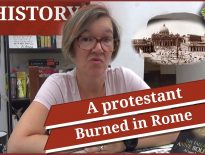On this day in history, 1st August 1555, Sir Edward Kelley, apothecary, alchemist and medium, was born in Worcester.
Kelley was a fascinating man. He worked with Dr John Dee and the men believed that they communicated with angels. Kelley also claimed that he was an alchemist and he wrote a treatise on the Philosopher's Stone.
Find out more about Kelley and his work in today's talk.
You can read Kelley's treatises at https://ia902704.us.archive.org/19/items/AlchemicalWritingsOfEdwardKelly1893/Alchemical-Writings-of-Edward-Kelly-1893.pdf
And here's my video on Dr John Dee
Also on this day in history:
- 1534 – Germain Gardiner wrote a tract against reformer and martyr John Frith entitled “A letter of a yonge gentylman named mayster German Gardynare, wherein men may se the demeanour and heresy of John Fryth late burned”.
- 1545 – Birth of Andrew Melville, Scottish theologian and Principal of St Mary's College, St Andrews University, at Baldovy, Angus.
- 1556 – Burning of Joan Waste, a blind woman, in Derby for heresy after she refused to recant her Protestant faith.
- 1596 – Death of John Astley (Ashley), courtier, probably at Maidstone in Kent. He was buried there at All Saints' Church. Astley served Elizabeth I as a Gentleman of the Privy Chamber, Master of the Jewel House and Treasurer of the Queen's Jewels and Plate. He was also married to Katherine Astley (née Champernowne), Elizabeth I's former governess and Chief Gentlewoman of the Privy Chamber.
- 1605 – Death of Sir Edmund Anderson, Judge and Chief Justice in Elizabeth I's reign, in London. He was buried in the parish church at Eyworth.



Edward Kelley, was also known as Edward Talbot (can’t say I ever remember anyone calling him that). As we know he had a very charmed life so to speak, and claimed he could talk with spirits, probably after he had drank a lot of spirits too.
After Dee’s star began to fade in Elizabeth’s court, they tried their luck in the Holy Roman Emperor Rudolph’s court. Rudolph was to say the least slightly unhinged, and strongly believed in the occult and all things magical and believed Kelley when he said he could turn base metals into gold etc..
Kelley lived well due to his patron Rudolph and was even knighted by him in 1589/90. However in May of 1591 Rudolph had Kelley imprisoned for allegely killing a court offical in a duel. Although it may well be that Rudolph was starting to lose his paitence with Kelley, because as yet he had failed to produce any of the promised Gold.
In 1595 Rudolph realeased Kelley and restored his former glory on the understanding that he should return to his alchemy lab and begin work on making gold.
When Kelley failed Rudolph lost all paitence and threw Kelley into Hnevin Castle and in late 1597 or early 1598 Kelley fell to his death when trying to escape, although some believe he was put to death on the orders of Rudolph. A kind of “Did he fall? or Was he pushed?”
John Dee did fair better and at least was able to return to England and died in 1608/1609 aged 81 (a very goodly age for the time) in Mortlake, Surrey.